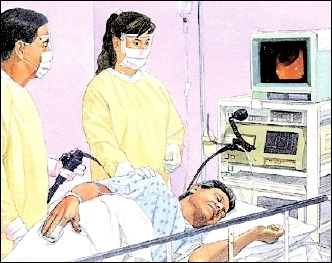Your doctor will do a medical evaluation to find the site and cause of your bleeding. He or she will ask about your health and examine you. Certain procedures may also be done to help confirm the diagnosis and plan your treatment.

Special Tests You May Have
A sample of your stool will be checked for blood. Any of these procedures may also be done:
- A sigmoidoscopy to examine your rectum and sigmoid colon using a lighted tube. Most often, sedating (relaxing) medication is not needed.
- A colonoscopy to look at your colon and rectum. You may be given medication through an IV (intravenous) line to help you relax.
- A barium enema to view your colon. A chalky liquid containing barium is passed through the rectum and into the colon. This liquid enhances the x-ray images taken of your colon.
- An upper endoscopy to check your esophagus, stomach, and upper small intestine. This procedure is used in cases of severe rectal bleeding.
Your Treatment Plan
Your treatment depends on the cause of your rectal bleeding. Your doctor will make a plan that’s right for you. Sometimes, rectal bleeding stops on its own. If it does, be sure to still see your doctor to check that the problem wasn’t serious. Always follow your doctor’s advice.
What You Can Do
Follow all your doctor's instructions. And keep working with him or her after your treatment. You may need follow-up visits. If rectal bleeding recurs, it may be a sign of the same or another health problem. Be sure to see your doctor right away.
